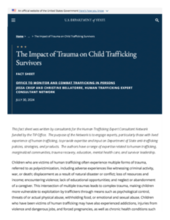This fact sheet was written by consultants for the Human Trafficking Expert Consultant Network funded by the TIP Office. The purpose of the Network is to engage experts, particularly those with lived experience of human trafficking, to provide expertise and input on Department of State anti-trafficking policies, strategies, and products. The authors have a range of expertise related to human trafficking, marginalized communities, trauma recovery, education, mental health care, and survivor leadership.
Children who are victims of human trafficking often experience multiple forms of trauma, referred to as polyvictimization, including adverse experiences like witnessing criminal activity, war, or death; displacement as a result of natural disaster or conflict; loss of resources and income; encountering violence; lack of educational opportunities; and neglect or abandonment of a caregiver. This intersection of multiple traumas leads to complex trauma, making children more vulnerable to exploitation by traffickers through means such as psychological control, threats of or actual physical abuse, withholding food, or emotional and sexual abuse. Children who have been victims of human trafficking may have also experienced addictions, injuries from violence and dangerous jobs, and forced pregnancies, as well as chronic health conditions such as increased likelihood of medical complications, somatic symptoms, impaired sensorimotor development, and hand-eye coordination problems, further adding to their trauma.

